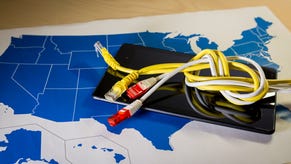Sony tackles BBC over 'PS3 failure' report
Sony issues six page rebuttal of BBC's Watchdog claims that PS3 hardware suffers from inherent technical failures
Sony has issued an unprecedented defence of its PlayStation 3 console amid claims that it is suffering from inherent hardware failure issues, and that Sony's out of warranty repairs service is inadequate.
The BBC's Watchdog programme will tonight air a report claiming Sony "refuses to fix" systems suffering from the so-called 'yellow light of death', which forces the console to shut down immediately after booting up.
In response, Sony has issued a detailed six page document, reprinted in full on GamesIndustry.biz, questioning the accuracy and research of the Watchdog report.
"From the correspondence to date, I have serious concerns as to the accuracy of these allegations and the likely tone of the Watchdog report," wrote Ray Maguire, MD of Sony UK, in response to Watchdog's allegations.
"The information that you have provided suggests a fundamental misunderstanding of the technical issues and a mis-characterisation of SCEUK’s Out of Warranty repairs policy."
As a stunt for the show, Watchdog set up a van outside Sony's UK headquarters – dubbed the PlayStation Repair Action Team – earlier this month and offered to fix consoles suffering from the hardware problem for free.
Watchdog received 155 complaints from viewers, with 10 viewers showing up for the street stunt. Watchdog also issued a technical report to Sony, based on only three home consoles, one of which had already been subject to an attempted repair by a user.
"The testing concerned a sample of only three PS3s, which cannot, on any basis, be deemed to be representative of a UK user base of 2.5 million," stated Sony. "One of these had in addition been materially altered by the owner."
"SCEUK has run searches of its customer complaints/warranty database to identify the number of reports made to it regarding instances of system shutdown or failure in circumstances where the front panel yellow indicator is illuminated," added Maguire. "The results show that of all PS3s sold in the UK to date, fewer than one half of one per cent of units have been reported as failing in circumstances where the yellow indicator is illuminated."
A third-party refurbishing company repaired consoles for Watchdog, with the firm usually charging around GBP 103 for repairs on a PlayStation 3, compared to Sony's cost of GBP 128, charged once a console is out of its one-year warranty.
"Importantly, it is clear that third party repairers will profit from any public concern that is raised about the reliability of the PS3, and have an interest in criticising SCEUK’s after sales service (despite the relatively small price differential in their own service offering). "The BBC will therefore doubtless wish to exercise caution before relying on anecdotal evidence, provided by them, concerning the extent or cause of these issues," offered Maguire.
It's expected Watchdog will attempt to compare Sony's issues to Microsoft's now infamous Xbox 360 'red ring of death' problem, which prompted the company to extend the warranty of the home console to three years from the purchase date.
The show will air this evening in the UK at 8pm. The official website explains that "Iain Lee solves a problem with one of the best known gadgets in the world - which the manufacturers refuse to fix."
Presenter Iain Lee is no stranger to the videogame business, having fronted corporate events for the likes of Capcom and Microsoft. He has also been employed on a freelance basis by Microsoft, according to his work for MSN's Tech and Gadget site.
Maguire concluded his correspondence by warning the BBC that it will take "all necessary steps" to protect the business and the PlayStation brand
"I regret to say that neither the correspondence to date, nor the 'PlayStation Repair Action Team 'stunt, have given me much confidence that you are treating this issue fairly. If the report is broadcast in what appears to be its current form, SCEUK will scrutinise its accuracy and will take all necessary steps to protect its reputation and that of the PS3."
A spokesperson for the BBC told GamesIndustry.biz that "Watchdog is investigating this matter, but the programme makers will not comment on stories before transmission as it can jeopardise the investigation".
UPDATE: The BBC has aired the show, during which it admitted that a number of the consoles it repaired for consumers have once again broken.
The full response from Sony to the BBC's Watchdog programme is reprinted below. Some names have been removed:
11th September 2009
Dear XXXX
BBC Watchdog – 17 September 2009
Further to your recent correspondence with our PR agency and parent company, I am writing to respond to your queries in connection with the edition of Watchdog that is scheduled for broadcast on Thursday 17 September 2009. I should state at the outset that we are, of course, disappointed if a small number of our consumers appear to have experienced problems with their PlayStation 3 units outside the manufacturer’s warranty period and we take our customer care obligations very seriously. It is for this reason that SCEUK operates a service of out of warranty repair or replacement (replacement with a refurbished unit within 48 hours at the consumer’s convenience by courier). To be clear, this service is subsidised by SCEUK, there is no profit made by SCEUK on this service.
You have informed us that this broadcast will include a report concerning faults alleged to affect PlayStation®3 consoles, and SCEUK’s policy on out-of-warranty (OOW) repairs. Most importantly, we entirely refute the suggestion that PS3 consoles have an inherent defect or other design issue which is akin to any warranty issue experienced by another console manufacturer. SCEUK has sold 2.5 million consoles in the UK since March 2007 and stands by the quality of its products. Clearly the allegations you propose to air in your program might have the potential to adversely effect Sony Computer Entertainment’s reputation for supplying high quality products and customer service and we take very seriously any issues that can impact the public’s or our customers’ confidence in those products.
From the correspondence to date, I have serious concerns as to the accuracy of these allegations and the likely tone of the Watchdog report. The information that you have provided suggests a fundamental misunderstanding of the technical issues and a mis-characterisation of SCEUK’s OOW repairs policy. It is in all parties’ interests that your reporting does not contain inaccurate or distorted information and the facts are presented in a manner which is not misleading or exaggerated. I trust the detailed information in this letter will enable the BBC to adopt a more balanced and sober approach to this issue than we have experienced to date.
Technical issues1. You have indicated that a number of viewers had contacted you to complain about a fault affecting their PS3 systems, whereby “a yellow light appears and their console then stops working – anecdotally called the ‘yellow light of death’” (your email of 18 August 2009).
2. You clarified in your letter of 25 August 2009 that the majority of those viewers had experienced problems with the 60GB launch model of the PS3. In that letter, you went on to say that, after examining three PS3 systems that had “displayed symptoms” of this fault, the consultancy noted the presence of higher levels of voids in soldering than would have been expected, in the case of two of those units. Your letter continued: “These voids can be problematic in some cases, but by no means in all cases. In some instances,… these voids can fracture at the inter-metallic interface… If this fracture was to occur on a vital connection, it would stop the console from working. [Consultancy] is of the opinion that this problem [presumably: excessive voiding] has occurred during the manufacturing process and not as a result of consumer use or a thermal effect during use.”
3. Your letter went on to say that, in the opinion of three commercial repairers of PS3 systems, the supposed “‘yellow light of death’ fault is caused by a soldering issue”.
4. With respect, neither your letter of 25 August nor any other information you have provided (including the [Consultancy] report) establishes that there is such a thing as a “‘yellow light of death’ fault”. In this regard:
The phrase “yellow light of death” has been adopted by certain members of the online community to describe the situation in which PS3 systems have shut down following the illumination of the yellow light on the PS3’s front panel. The yellow indicator is simply a non-specific fault indicator that can be triggered in a range of different circumstances. For example, it could indicate a problem caused or exacerbated by the console’s power supply, by overheating, by poor ventilation, by software issues or by any one of a range of issues that may inevitably affect any complex item of consumer electronics.
SCEUK has run searches of its customer complaints/warranty database to identify the number of reports made to it regarding instances of system shutdown or failure in circumstances where the front panel yellow indicator is illuminated. The results show that of all PS3s sold in the UK to date, fewer than one half of one per cent of units have been reported as failing in circumstances where the yellow indicator is illuminated. As Watchdog has a very high awareness amongst the UK audience, it isn't surprising that some people have contacted you with regard to this issue. However we think it is highly unfair to suggest that from an installed base of 2.5 million that the numbers you mention somehow are evidence of a 'manufacturing defect'.
The comparison with other console warranty issues is wholly inappropriate, in circumstances where – as here, and as discussed further below – there is no evidence of a manufacturing voiding defect affecting any PS3s; where the voiding identified by the expert contacted by the BBC is within the tolerance levels set out by the applicable IPC standard; and where that expert analysis considered a sample of only three units and reached no firm conclusions as to the existence of a defect that could be detrimental to device operation.
5. The technical evidence that you have provided to support the assertion that there is a manufacturing defect affecting PS3s comes from two sources. First, you rely on anecdotal reports made by the three repairers whom you have contacted. As discussed further below, evidence provided by organisations of this sort who have a commercial interest in the repair of electronic goods must be treated with caution. Second, you have asked [Consultancy], a respected not-for-profit testing house, to carry out testing on a small number of reportedly failed units. We understand [Consultancy] did not produce a written report and you have provided a summary of your understanding from an interview with the relevant person. As regards the [Consultancy] analysis:
The testing concerned a sample of only three PS3s, which cannot, on any basis, be deemed to be representative of a UK user base of [c. 2.5 million]. One of these had in addition been materially altered by the owner.
The report identified “higher levels of voids than expected” in only two of these three units, which is itself sufficient to suggest that the technical hypothesis set out in your letter of 25 August 2009 (namely, that solder voids cause system failure) is incorrect. If this were the case, wouldn’t “higher levels of voids than expected” have been present in all three units?
[Report author] does not indicate the basis on which he considered that voiding at the levels seen – which, by his own admission, in no case exceeded 25 per cent sphere mass – were higher than he expected. In fact, assuming [Report author] is applying IPC standard A-610D (Acceptability of Electronic Assemblies, February 2005), that standard makes clear that “25% or less voiding in a ball x-ray image area” means that the product in question meets the relevant criterion for compliance. Although we have not been given the opportunity to confirm these results, [Report author's] findings appear to show the voiding levels in the consoles he examined to be below industry-accepted levels.
Most importantly, nothing in the report supports the conclusion that voiding was the cause of the problems reported as affecting the units in question. Indeed, the report specifically noted that: “[Report author] could not say if these voids would be detrimental to the device operation, as this can not be determined by x-ray, but he said that they have the potential to be detrimental.” The other language that he chose to use (e.g. “These voids can be problematic in some cases, but by no means all cases”) is likewise extremely cautious.
6. The BBC simply has no technical basis for asserting that the supposed “yellow light” issue results from a defect in the manufacture of PS3s, in circumstances where the BBC’s own technical expert is unwilling or unable to say that voiding (which is, in any event, within recognised industry tolerance) is problematic per se, or that it would have affected device operation in the case of even this small sample of units. All the more so, given the low level of complaints or warranty claims received by SCEUK on this score. Nor does the technical data justify the negative and hostile tone of the planned broadcast.
7. Overall, the allegations outlined in the correspondence to date are simply not substantiated by the technical data collected in support. Given the commercial and reputational harm that unsupported allegations of this sort may do to Sony and the PS3 brand, I would hope that the BBC exercises appropriate caution before leaping to conclusions or creating a “scare” among PS3 users by broadcasting such allegations on national television.
The warranty offered by SCEUK and OOW repairs8. Customers who purchase a PS3 benefit from a manufacturer’s one-year warranty, which is standard industry practice.
9. If a PS3 develops a fault during the warranty period, the customer can contact SCEUK, who will organise collection and supply of a refurbished unit (typically within 24-48 hours) by courier at the consumer’s convenience, free of charge. Under the terms of the warranty, customers are advised to make regular back-ups of the data they have stored on their PS3 and, in particular, to do so before submitting their console for warranty service.
10. Once the warranty period has elapsed, the customer will be charged £128 (inclusive of VAT). This figure reflects the cost of repairing a PS3 to the high standard required and includes a door-to-door courier exchange service and other general administrative costs. SCEUK does not profit from this service; in fact, it operates it at a loss in order to offer customers with OOW PS3s the best price possible.
11. Sony has invested substantially in creating state-of-the-art diagnostic and servicing facilities to support both in-warranty and OOW repairs. As regards the purported solution to the supposed “yellow light” issue adopted by commercial repairers, effecting a reflow correctly, to the required engineering standards and in a properly controlled static-safe environment requires the use of an infra-red BGA soldering station, which must be set up and programmed to run at very specific temperature profiles. Each such station costs tens of thousands of pounds. The diagnostic equipment required to test that the solder has been performed correctly costs a similar amount.
12. Consequently, even if a yellow indicator/system shutdown were triggered by a soldering issue/voiding, it would be misleading for you to suggest to viewers that the basic solder reflow process you describe in your letter to XXXXX of 7 September 2009 is necessarily a reliable procedure when performed in that way, or that it can properly be done cheaply and quickly.
13. Various commercial organisations not authorised by SCEUK provide repairs to PS3s and other consumer electronic devices. For example, [Third-party repair company] – who, you informed us, participated in the “PlayStation Repair Action Team” activity which you recently staged in Great Marlborough Street (see below) – charge customers £103.50 (inclusive of VAT) to repair and return customers’ PS3s which (in the company’s words) are affected by the “yellow light of death”. This figure is only £24.50 less than the cost to the customer of high-quality SCEUK repair, conducted using state-of-the-art equipment. In addition the consumer needs to arrange and bear the cost of getting the console to this organisation.
14. Importantly, it is clear that third party repairers will profit from any public concern that is raised about the reliability of the PS3 (as indicated by the use of language on their websites), and have an interest in criticising SCEUK’s after sales service (despite the relatively small price differential in their own service offering). The BBC will therefore doubtless wish to exercise caution before relying on anecdotal evidence, provided by them, concerning the extent or cause of these issues. The “PlayStation Repair Action Team” stunt
15. On 1 September 2009, BBC Watchdog filmed technicians from [Third-party repair company] carrying out repairs to PS3 units affected by the supposed “yellow light” issue. It was emphasised that this service was carried out free of charge, and that SCEUK does not carry out OOW servicing free of charge. For example, as is evident from stills available on the internet, the van in which the technicians worked was clearly labelled: “PlayStation Repair Action Team – SONY charge a fee – let Watchdog repair it for free” (emphasis as original).
16. I would ask you to think very seriously before including this segment in any report that is broadcast:
The premise behind this stunt (i.e., that SCEUK charge a repair fee whereas commercial repairers do not) is demonstrably false. As noted, the commercial repairers who occupied that van, and others like them, do not provide free servicing as a matter of routine. Indeed, their business model involves providing unauthorised servicing at only a minimal discount to the approved servicing provided by SCEUK. The BBC should not allow its agenda to be influenced by third party commercial interests who stand to benefit from revenue generated by repair fees.
It is standard practice for businesses in the electronics and many other consumer products sectors to provide free servicing/repairs only during the warranty period, but to charge for OOW repairs. It is therefore unfair to criticise SCEUK in this way.
The slogan on the van is in any event misleading, in that SCEUK does not charge any fee for in-warranty repairs/replacement.
Further as regards that slogan, if BBC Watchdog is indeed providing PS3 servicing at its own cost, then this is a questionable use of the licence fee, and one which may breach the BBC’s Charter. If, on the other hand, the [Third-party repair company] technicians involved in this stunt were, on this occasion, providing their services gratis, then we trust that this segment of the programme, if broadcast, will provide full details to viewers of [Third-party repair company's] usual terms, conditions and pricing, so as to permit viewers fairly to assess to whom they should turn in the event that they require an OOW repair for their PS3.
Finally, this stunt as a whole (and, in particular, the use of the acronym “PRAT”) treats with inappropriate levity an issue which may do serious damage to SCEUK and the Sony and PS3 brands. BBC’s duty
17. As a publicly-funded broadcaster, the BBC is under a duty to licence-payers to preserve its impartial editorial stance. It also has a duty of fairness towards SCEUK. Should the BBC decide to include an item on the PS3 in the 17 September edition of Watchdog, it will therefore wish to make sure that the issues you have raised in correspondence receive as accurate, fair and balanced a treatment as possible.
18. I regret to say that neither the correspondence to date, nor the “PlayStation Repair Action Team” stunt, have given me much confidence that you are treating this issue fairly. If the report is broadcast in what appears to be its current form, SCEUK will scrutinise its accuracy and will take all necessary steps to protect its reputation and that of the PS3. Unsupported and potentially misleading allegations of the sort that the BBC appears, from the correspondence to date, to be planning to make concerning the reliability of the PS3 could do significant commercial and reputational harm to Sony and its brands. This is particularly so, given the recent, highly successful launch of the new, slimmer model PS3 and the fact that the last quarter of the year is the busiest sales period for the consumer electronics industry.
Yours sincerely,
Ray Maguire,
Senior Vice President and Managing Director UK








